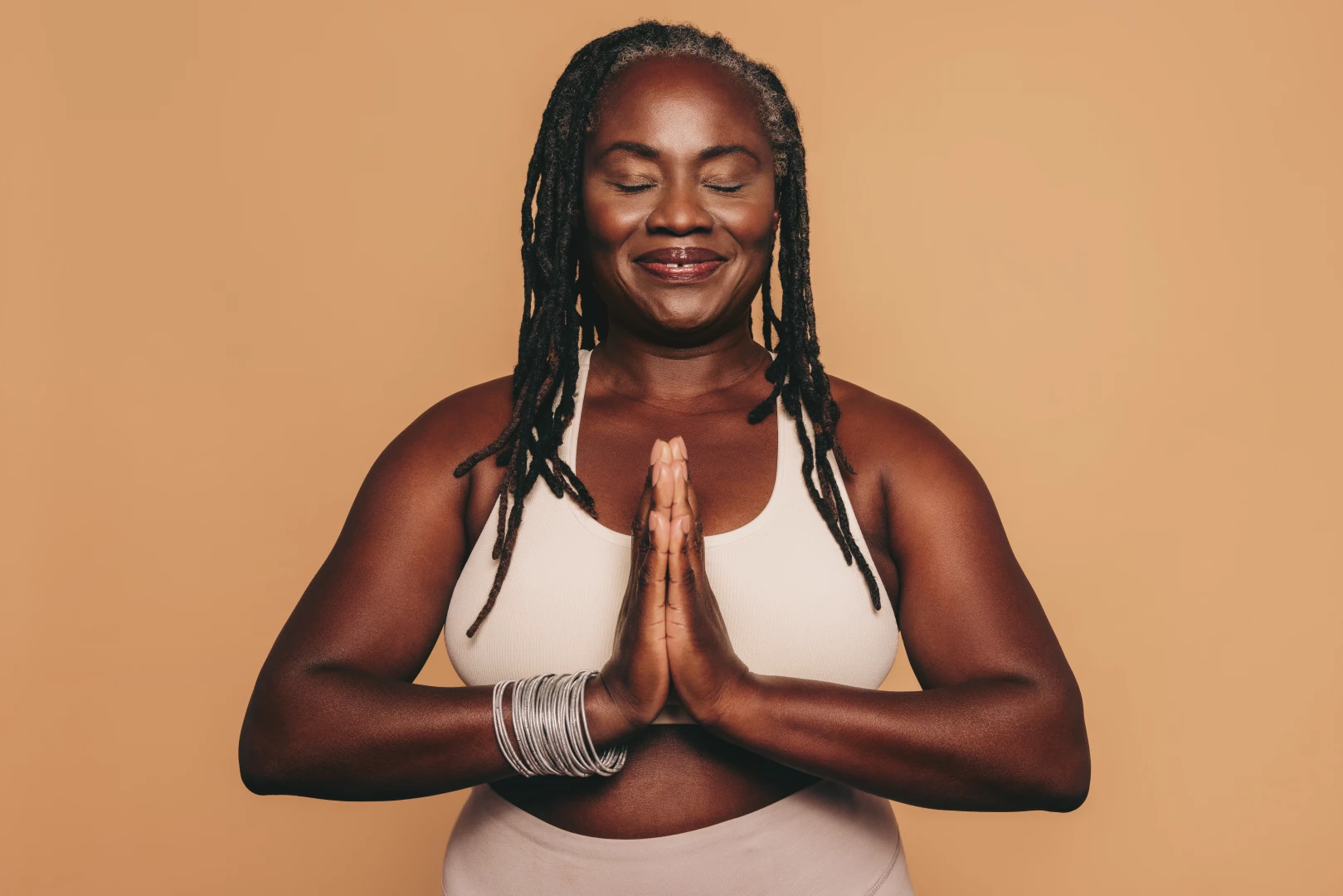Embodying Yoga’s Core Qualities: Joy as a Spiritual Practice

Article At A Glance
Sometimes your joy is the source of your smile, but sometimes your smile can be the source of your joy. – Thich Nhat Hanh
The word “joy” has more than one definition and is open to a wide variety of interpretations. But what is most important is how you choose to define and experience it for yourself.
Joy is often described as delight or pleasure resulting from an unexpected but wonderful short-term experience. The first time I experienced this form of joy was during a family vacation in Maine. I was 12 years old. We were hiking up Mt. Megunticook with friends. It was my first hike. The trail was steep, and the day was hot. I was not a happy camper, but when we got to the top, and I looked out over the landscape, I was suddenly in awe. I lost all sense of time and space. I was completely absorbed in the moment. It was sheer joy. It took my breath away, and I have never forgotten that moment.
Joy is also referred to as a longer-lasting, more permanent state. This definition seems to relate to the religious and spiritual sense of the word. It is perhaps what Joseph Campbell meant in his book, Reflections on the Art of Living, when he wrote, “We cannot cure the world of sorrows, but we can choose to live in joy.”
Joy, Happiness, and Contentment
There are two other words that often share space with joy: happiness and contentment.
Happiness is frequently defined as a short-term state of mind brought on by getting what you want in life; finding your soulmate, landing a dream job, winning the lottery, or finding that perfect little black dress that makes you look ten pounds thinner (I never found it 🤣). Like joy, happiness is also referred to as a longer-lasting life state, as in, “may you live a happy life,” or the title of Bobby McFerrin’s 1988 song, “Don’t Worry, Be Happy.”
Contentment is usually seen as long-term satisfaction, meaning a state of balance, tranquility and peace. It’s also been described as a state of being that can defy circumstances because it’s possible to feel contentment in the middle of difficulty or uncertainty where feelings of joy or happiness may not be present.
The terms joy, happiness, and contentment mean different things to different people in different situations and at different stages of life. I tend not to use the word “happy” because, in my opinion, it has become an overused buzzword. If you browse the ever-expanding list of self-help books, you’ll find the word “happy” in many of the titles. When I last searched that question online, Google found over 13,000!
For me, joy is closely related to contentment. I think of contentment as a smooth, calm lake that I float in. Joy is a sudden ripple that comes from an unexpected feeling of elation or a state of mind that visits when I’m totally absorbed in an activity I love.

Nature vs. Nurture
No matter how you define joy, experiencing it can result in a positive mental state that is linked to more life satisfaction, increased immunity, less disease, and better mental health. One large-scale study of more than 2,000 twins suggested that around 50 percent of overall life satisfaction was due to genetics, 10 percent to external events, and 40 percent to individual activity and choice. These results show us that we can make choices to bring more joy into our lives. Make the choice to fill your joy tank.
3 Steps to Filling Your Joy Tank
Think of a joy tank as a mental construct you fill with your attitude, choices and actions. Here are three steps that can help the process along.
- Build in time during your day to be a human being instead of a human doing. Too many of us rush around trying to do everything that we think needs doing or that others tell us needs to be done. Stopping for a moment to do nothing, and practice Wu Wei, as the Japanese call it, is often seen as a waste of time. Au contraire, my friend. Taking time to rest and restore is how you take your power back, and get centered. When you give yourself this gift you will gradually encourage and deepen feelings of calmness, safety, and security, which is fuel for your joy tank.
- Tickle your funny bone. There is plenty of research that shows the benefits of laughing. Laughing a few times a day will help you deal with the little daily glitches, snags, and stressors we all encounter. I’m sure you are familiar with the phrase, “laughter is contagious.” It makes you more approachable and spreads joy around. Laughter is a welcome ripple in the lake of contentment.
- Find a creative outlet. It can be anything you are drawn to from painting, knitting, writing, gardening or scrapbooking, to name a few. Science is still uncovering proof that creativity in whatever form you are drawn to is helpful for managing stress, boosting your immune system and is beneficial for your overall mental health and wellbeing. Creative activities help us empty our minds and hearts of toxicity and can actually change our brains by releasing serotonin, dopamine and endorphins, the feel-good chemicals. Another source of fuel for your joy tank.
Your Personal Joy Tank
It’s up to each of us to find, or recognize, activities, practices and experiences that fill our joy tanks and slow any drain resulting from life’s ups and downs. May your joy tank always fill to overflowing.
Also, read...
Extending Your Lifespan: 10 Recommendations For Longevity with David Sinclair
Closing Down the On-Ramp to Alzheimer’s
How Can Yoga Help Ease Mood Swings, Anxiety and Depression? An Interview with Linda Sparrowe
Related courses
Keys to Finding Inner Strength: A Yogic Wisdom Path to Developing Greater Resilience
Somatic Yoga for Fascial Unwinding

Beth Gibbs, MA, is a faculty member at the Kripalu School of Integrative Yoga Therapy. She holds a master’s degree in Yoga Therapy and Mind/Body Health from Lesley University in Cambridge, MA. She is the author of Soul Food, Life-Affirming Stories Served with Side Dishes and Just Desserts, Enlighten Up! Finding Clarity, Contentment, and Resilience in a Complicated World and Ogi Bogi, The Elephant Yogi, a therapeutic yoga book for children. Beth is an experienced workshop leader and public speaker. She blogs at bethgibbs.com




